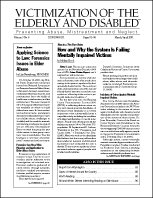Psychosexual Evaluations in Intellectually Disabled Clients: Part I
Author: Jeffrey B. Allen, Ph. D..
Source: Volume 14, Number 01, May/June 2011 , pp.7-8(2)

< previous article |next article > |return to table of contents
Abstract:
Professionals from a variety of disciplines involved in the criminal justice system are users of court-ordered client psychosexual evaluations and risk assessments. Various forensic professionals rely upon these documents at many stages of the legal process—pre-plea, pretrial, trial, disposition, incarceration, release, and community supervision. Yet, in my experience, few nonclinical professionals ever receive formal training in how to recognize a competent evaluation. This statement is even more true for psychosexual assessments of intellectually disabled (ID) clients, for whom the standard evaluation and assessment procedures sometimes have to be modified in order to obtain valid and usable results. The present article was written to help nonclinical professionals learn to identify what to look for in evaluating the quality of psychosexual evaluations they use and to assist them in developing the skill of asking the most relevant and useful referral questions to evaluators. Particular attention is given tothe modification these documents require for their use with ID clients. The first part of this article covers five elements within the psychosexual evaluation. Part II, appearing in an upcoming issue of VED , will explain what to look for when evaluating ID patients.Keywords: court-ordered psychosexual evaluations; risk assessments; training in how to recognize a competent evaluation
Affiliations:
1: PSYCHealth Associates.